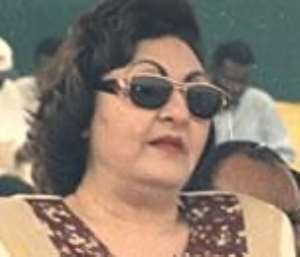
Just recently, I went to visit the Kwame Nkrumah Mausoleum where The Man lies next to his wife, Fathia, presumably for eternity. The visit reminded me of my first meeting with the late former First Lady.
It was in 1985 or thereabouts. I recall going to her residence at La Bone. I can't quite remember whether I went there on my own initiative or I was sent there by my Ghana News Agency editors. Never mind. I went there.
Samia, Kwame Nkrumah's only daughter, left the house shortly after I turned up. She had to make an international phone call, and Dr. Ackah Blay-Miezah was one of the few people in the city with private international direct dial. He had offered his treasured phone¬-line to Samia; so she had to travel all the way to MaCarthy Hill to make an international call. How things have changed!
Anyway, I inter¬viewed Fathia. She was very unhappy. She showed me around the house which General Kutu Acheampong's re¬gime built for the family. It was falling apart. Sinks were broken. Pipes were leaking. Walls were cracked: And the white ceilings were stained because the rain seeped through the roofs.
She showed me the left over of a bag of rice. That's all the food she had left. Sometimes she received a little bit of help from a few old CPP associates. But she hated to beg from Nkrumahists or wait endlessly for handouts from state protocol whose job it was to provide her needs. She felt abandoned. Above all, she felt her husband's memory and legacy were being disrespected. So she had decided to leave Ghana. I filed a scoop for GNA. Within weeks she was gone.
She returned twelve years later in 1997 dur¬ing the 40th anniversary of independence. I went to see her at the Golden Tulip where she stayed for a week or so, but she declined to be interviewed, ceding the limelight to her son Gamel instead.
Her next trip to Ghana was inside a coffin.
I appreciate her frustrations about the quality of life in Ghana in the mid-eighties. But it was a reflection of the economic situation at the time. I don't believe that the PNDC set out to make living in Ghana uncomfortable for Fathia and her family. However, when the economy improved and her house was repaired, I believe it ought to have been offered back to the family and she should have been invited "home."
In one sense, Fathia was privileged to have been Kwame Nkrumah's wife and borne him children. But she also paid a personal price for being Mrs. Nkrumah. Nkrumah didn't even believe in the institution of marriage. In a letter written in November 1964 to Shirley du Bois, head of the Ghana Television Service, on the sub¬ject of his family's pri¬vacy, Nkrumah wrote:
"Marriage does not exist in nature and does not warrant the importance that has come to be attached to it. It is a bourgeois imposition, a mere contrivance set up as a matter of human convenience for the protection of inheritance rights, capitalists and property-owners."
In another letter written in August 1965 to Erica Powell, his private secretary, then away in London, Nkrumah said:
"Have you noticed that. .. I'm a very lonely man? I'm friendless and companionless. I suf¬fer from intense loneliness which makes me sometimes burst into tears. I am an isolated man - isolated even from life itself. Few people know this. They see me in public smiling and laughing, not knowing the burden of loneliness and isolation that I carry. Marriage did not solve it - it has rather intensified and complicated it. You know I didn't want to get married. You know my views on the subject. Did I ever tell you that I married not for myself but for the presi¬dency?"
Credit: Kwaku Sakyi Addo/The Spectator




 OSP cleared Cecilia Dapaah of corruption offence not me – Godfred Dame
OSP cleared Cecilia Dapaah of corruption offence not me – Godfred Dame
 Election 2024: EC to commence replacement of voter ID cards on May 30
Election 2024: EC to commence replacement of voter ID cards on May 30
 Court dismisses interlocutory injunction application against Minerals Commission...
Court dismisses interlocutory injunction application against Minerals Commission...
 CDD-Ghana criticises govt handling of Cecilia Dapaah’s money laundering case
CDD-Ghana criticises govt handling of Cecilia Dapaah’s money laundering case
 Medikal explains why he performed with Sister Derby at O2 Indigo concert
Medikal explains why he performed with Sister Derby at O2 Indigo concert
 NPA to engage Finance Ministry to consider removing taxes on LPG
NPA to engage Finance Ministry to consider removing taxes on LPG
 Ghana will not derail into political turmoil under my watch — Akufo-Addo
Ghana will not derail into political turmoil under my watch — Akufo-Addo
 Namibia's unique desert lions threatened by drought and human conflict
Namibia's unique desert lions threatened by drought and human conflict
 Togo's ruling party wins parliamentary poll in victory for longtime president
Togo's ruling party wins parliamentary poll in victory for longtime president
 Paramount Chief of Gwollu dead
Paramount Chief of Gwollu dead
